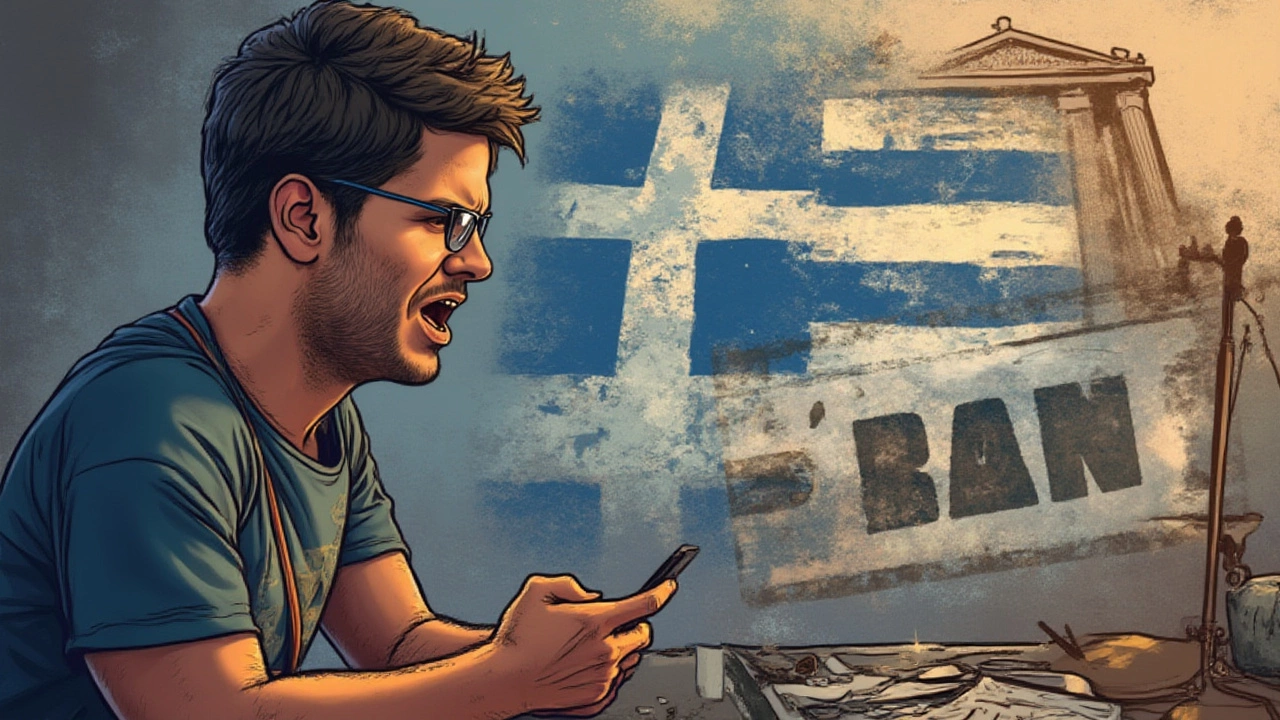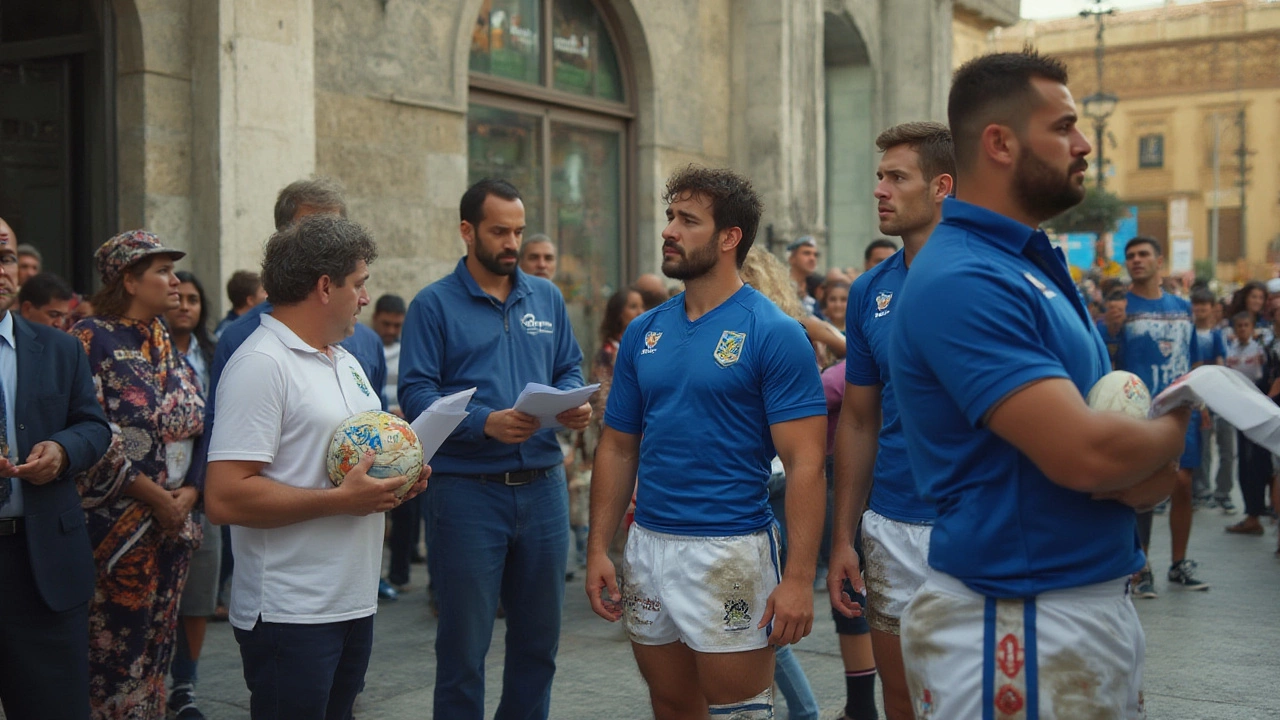Picture this: A whole nation’s rugby players sitting out, not for lack of skill, but because of tangled off-the-pitch drama. Greece—home to ancient stadiums, rowdy football fans, and a love for sport stretching back millennia—has long been missing from the international rugby scene. Not from lack of interest, but due to one of the oddest sagas ever to play out in world sports. You might hear about bans due to doping or scandal, but this? This one all boiled down to paperwork, politics, and a governing system that tripped over its own feet.
The Origins of Rugby in Greece
You’d never guess it, but rugby isn’t exactly a new idea in Greece. The game popped up in the late 1980s when a handful of expats and adventurous Greeks kicked off unofficial matches on scrappy fields. By the early 1990s, some local teams actually organized a league all their own. Yet, even with all that heart, rugby would end up fighting upstream against bureaucracy and more popular sports—that’s code for football (soccer), which is basically a national obsession in Athens and Thessaloniki.
There was slowly growing excitement. Junior teams appeared. Kids swapped stories about tackling and scrumming, even if my own Jasper and Leona looked at me like I’d grown a second head talking about lineouts. Still, the infrastructure lagged. Most facilities were leftovers, not designed for rugby’s churn. The Greek Rugby Federation (EOP) came into being in 2004, and by 2005, Greece had joined World Rugby, which meant officially they could take the field. If they could keep up with the paperwork.
This is where things started to unravel. Greek sports federations run on strict government oversight. You can’t just form one and go—there’s a checklist longer than a summer road trip packing list filled with forms, elections, and recognition procedures. But from the jump, not every “i” was dotted nor “t” crossed. Internal disputes and clashing personalities in the Federation only made things messier. All it took was a little disagreement and the organization’s entire status turned iffy.
Meanwhile, World Rugby cares about one thing above all: stability. If a national federation isn’t legally recognized in its own country, it puts everyone in an awkward spot. Other nations don’t want to field teams against a body that might not even officially exist next season. The responsibility for organizing safe play, anti-doping checks, and youth development just isn’t guaranteed if the home office is on wobbly ground. That’s the first big step in understanding why Greece got frozen out of the action just as things were picking up.
Bureaucratic Hurdles and Legal Mix-Ups
Let’s zoom in on the nitty-gritty. Greek law is wild when it comes to sports governance. To be allowed to take part in competitions, a national sports federation in Greece must get what’s called “official recognition” from the Ministry of Culture and Sports. Unlike in many countries, where private associations handle their own business, Greece holds tight control—with regular audits, mandatory board elections, and a slew of regulations that would scare off half the rugby world.
By 2014, things turned sour. The Greek government decided—after a couple of ugly internal disputes—that the EOP hadn’t played by the book. The details probably deserve their own Netflix documentary: contested meeting minutes, questionable appointments, and, at one time, competing boards both claiming to be the true Federation. The government revoked its legal status, locking it out of funding, facility access, and, crucially, the right to officially represent Greece.
To top it off, in 2015, the government named the Hellenic Handball Federation as the “interim” authority for rugby, but this new body didn’t have international recognition. Picture a rugby-loving handball coach—his whistle and clipboard more “seven-meter throw” than “scrum-half.” The confusion trickled down: teams didn’t know who to call for fixtures, and even youth clubs stopped forming, worried they’d spend all year training for a tournament that might not happen.
Behind the scenes, frustrated volunteers—many of them parents, players, and local business owners—kept the sport alive with friendly matches and bootstrapped training sessions. I remember hearing from a family in Athens about the “underground” rugby games, where players hauled their own kits and used cones borrowed from the nearest football club. The passion stayed, but the system didn’t.

The International Impact and Suspension
The growing pile of paperwork and confusion eventually reached the ears of World Rugby and Rugby Europe. Both bodies held a clear rule: Each member country must have a stable, officially recognized national governing body to compete. When Greece lost its recognized federation, World Rugby had little choice but to suspend the country’s membership. This meant the Greek national team, which had only just begun to turn heads in the Rugby Europe Conference 2 division, was benched—even as their rivals cheered the points they’d gain by walkover.
The most glaring impact? Greek teams vanished from the calendar. You looked at the schedule, and there’d be random byes where Greece was supposed to be. Young players, who’d invested season after season, suddenly had no chance to put their skills to use. I think about Jasper’s rugby-mad friend who joked that Greece had gone “ghost mode” in Europe—but for some athletes, the loss of opportunity was real heartbreak.
In numbers, Greece ended up missing both XVs and Sevens tournaments for two full seasons. According to Rugby Europe’s 2016 data, Greek clubs saw a staggering 40% drop in registered youth players by the time the suspension started taking its toll. Club-level rugby, always fragile in a football-dominated country, started weakening even further. Sponsors, never exactly lining up around the block, melted away. The best young players, now without a clear path to international play, considered joining local football teams or, in a few cases, moving abroad to keep their rugby dreams alive.
| Year | Greek Rugby Clubs | Registered Players | National Matches Played |
|---|---|---|---|
| 2013 | 14 | 780 | 7 |
| 2015 | 11 | 490 | 5 |
| 2017 | 6 | 250 | 0 |
| 2019* | 9 | 430 | 4 |
*Numbers show some recovery after re-recognition and resumption.
But here’s the kicker—the ban wasn’t about dirty play, cheating, or snaps of steroid needles. It was all about *recognition* and who gets to hold the pen and stamp the letterhead. If you think that sounds like the slowest, most frustrating red tape in world sport, you’re right. It was an administrative vacuum, not bad sportsmanship or a scandal, that pushed rugby in Greece to the sidelines.
The Fight to Lift the Ban
The next chapter? A grassroots fight to fix things. Greek rugby folks—players, coaches, parents, even a few expats who couldn’t bear to see things fall apart—rallied. They traded WhatsApp messages. Held pop-up training days. Petitioned local councils. The goal was simple: prove to the authorities and World Rugby that there was real demand for the game, even if the paperwork had gone astray.
By 2019, after a mountain of applications and more boardroom negotiations than Greek drama ever dreamed of, the Ministry of Sports agreed on a newly recognized Hellenic Rugby Federation. This body passed all the required audits, held its elections under the ministry’s watchful eye, and got the all-important approval letter. World Rugby, taking their lead from the national government, officially lifted the ban later that year.
The comeback didn’t wipe out the scars. The two-year freeze cost Greece two entire generations of kids who missed out on international play. Recruiters from other sports—not just football, but water polo and basketball—scooped up the leftover talent. Meanwhile, the handful who weathered the drought became diehard rugby advocates. At family barbecues, and sometimes at the school gates, I picked up stories from exhausted moms and dads who stayed after work to drive their kids three hours just to make up for lost training time.
- If you’re curious about getting involved with Greek rugby post-ban, check out local expat forums and sports clubs—things are rebuilding fast.
- One tip: look for tournaments in offbeat places like Patra or Crete, where rugby is quietly making a comeback outside the big cities.
- Want your kids to try rugby in Greece? Bring patience, but also connect with other parents. The network makes a difference in finding the right games and practice sessions.
There’s a lesson here about perseverance—one that echoes well beyond sports. No matter how confusing the rules get, a determined community can find a way back onto the pitch.

Lessons from the Ban: Tips, Facts, and What’s Next
So, what can countries (and fans) learn from Greece’s case? First, it’s a wake-up call about the nitty-gritty of sport governance. It’s not enough to have players, schedules, and a field to play on. Associations must keep their paperwork spotless, rules transparent, and leadership sorted—or risk being benched in a bureaucracy blind spot. Miss one deadline or skip one audit, and suddenly an entire national team just doesn’t exist on the world stage.
You may be tempted to roll your eyes at the mention of “federation recognition,” but it’s the backbone for youth development, funding, and player safety. Without it, dozens of grassroots clubs—ones where kids like my Leona would first touch a rugby ball—can lose access to facilities, insurance, and the kind of resources that keep sport safe and fun.
There’s another surprising fact: the Greek rugby ban stood out worldwide. World Rugby rarely has to pull membership for anything besides major corruption or criminal acts, so seeing *Greece rugby ban* on a list next to heavyweights like South Africa or New Zealand—usually for entirely different reasons—caught everyone off guard. It prompted other small rugby nations to re-check their own documents and rules, so at least there’s some progress in diplomacy and sports law.
Here’s a tip for any amateur sports federation, whether you’re in Greece or beyond: stay in close contact with your country’s sports ministry or regulatory authority. Assign someone to handle legal compliance. Hold your elections on time, keep records straight, and don’t be afraid to seek advice from international federations if things get murky. In rugby (and other Olympic sports), legal status really is the secret ingredient to actually playing the game at all.
Now, if you show up to a rugby match in Greece—especially in the past five years—you might notice how fiercely players protect the legacy of those lost seasons. There’s a sense of pride in simply being able to play, to tape up boots and throw a pass knowing the game is finally free to grow. And if you ever want to experience full-on Greek hospitality, track down a local club’s after-match meal—they’ll regale you with stories about the hard-fought fight back onto the pitch.
The story isn’t a cautionary tale just for Greeks. It shines a light on the unseen work that keeps our favorite games alive and legal, from the tiniest playground leagues to the biggest world cups. For Greek rugby, it’s about proving every week that the game is for anyone willing to hold on, even when red tape ties your hands.
